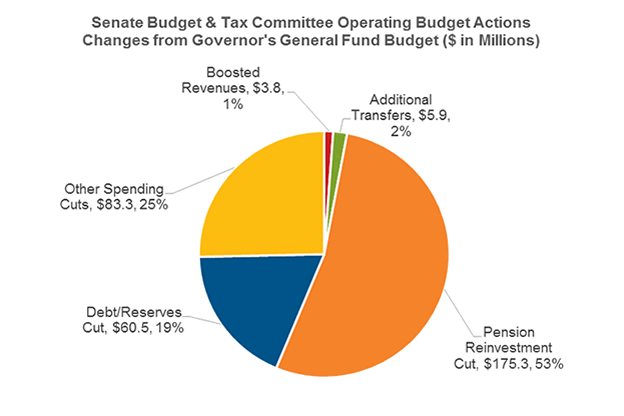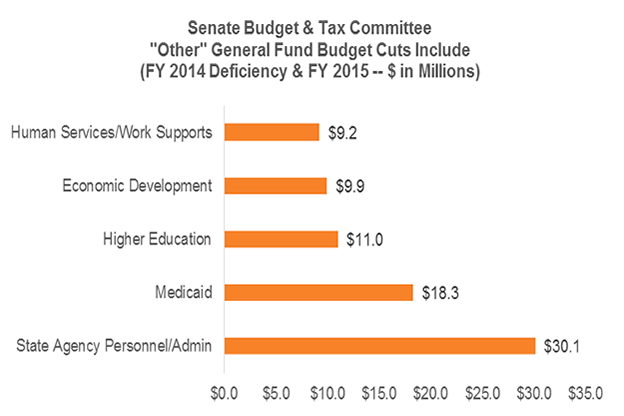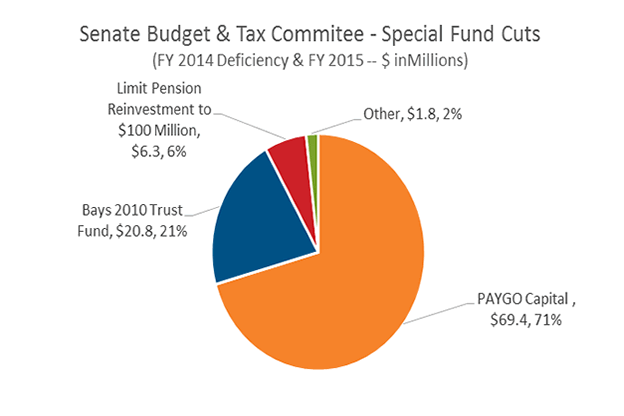Senate's Budget Relies on Short Term Solutions at the Expense of Long-term Investment
While the recently passed Senate budgetavoids large cuts to services, the Senate plan includes unwise and unnecessary spending cuts and other short-term budget-balancing maneuvers that will cause long-term financial problems for the state. The Senate ought to reconsider its approach by adopting proposals that would responsibly boost revenue and abandoning irresponsible tax cuts that largely benefit corporations and millionaires.
In addressing the recently released estimate expecting $238 million less revenue, the Senate relied on spending cuts to bring the budget into balance. In the face of this large reliance on spending cuts, state leaders should certainly not cut to the state corporate income tax or increase the estate tax exemption. These would put the state in even worse financial shape.
While the Senate’s plan will balance the budget in the short term, it will cost Maryland in the future. While Governor O’Malley’s budget proposed to reduce pension investment by $100 per year, the Senate plan doubles this reduction. Recent pension reform increased employee contributions and cut benefits, in addition to cutting the state’s contribution for pension costs for local educators, like teachers, librarians and community college staff. The Senate’s decision to reduce pension investment came despite expert warnings about the damage caused such cuts. The State Treasurer and Comptroller, the Chair and Vice Chair of the State Retirement and Pension System, recently testified against further cuts to retirement fund reinvestment; and Treasurer Kopp pointed to the $1.8 billion long-term cost of a permanent cut.
In addition, the Senate budget includes unwise cuts to assistance and supports for the state’s working families that are sound investments and leverage additional funds. The Senate plan cuts $18.3 million in state funds for Medicaid, which are matched dollar-for-dollar by federal funds. These unwise cuts to funding intended to expand community-based care options and nursing home care could threaten access to care for Medicaid recipients.
The Senate plan also cuts $1 million for childcare subsidies, which leverage federal matching funds, and $900,000 from the Employment Advancement Right Now job-training program. Like the diversion of pension savings, these short-term, one-time cuts cost the state the opportunity to further shore up its long-term fiscal condition by creating a stronger workforce.
In addition to the General Fund cuts, the Senate plan removes Special Funds that would have gone to fund Program Open Space and Land Preservation.
Like the governor’s plan, the Senate includes the transfer of $69.1 million to the General Fund, as well as an additional $69.1 million cut to related Special Funds pay-as-you-go (PAYGO) capital funding. The Senate plan would replace these special funds in the Capital Budget with additional debt, above DLS-recommended levels. Increasing capital debt to balance the Operating Budget is not a sustainable budget-balancing tactic and limits financing options in the Capital Budget.
Legislative analysts have also pointed out that interest owed on state debt and pension costs are consuming a growing portion of the Operating Budget (page 19 at link). Like the diversion of pension savings and Medicaid and child care cuts, these short-term tactics hurt working families and cost the state the opportunity to further shore up its long-term fiscal condition.
Fortunately, alternative options to these unwise cuts are available as the House passes its version of the Operating Budget and it moves to conference committee. Increasing tobacco taxes as proposed in the Healthy Maryland Initiative (HB443/SB589) would raise $110.8 million in FY 2015 General Fund revenue. In addition, legislative analysts recommended large reductions to personnel expenses, including a phase-in of merit pay increases for state employees throughout the fiscal year, reducing the number of health insurance premium holidays, and other state personnel cost-containment not adopted by the Senate. These would allow the state to continue making critical investments in things like pensions and child care.
Check back here for more information on House budget actions and the impact on valuable and proven services and programs.



